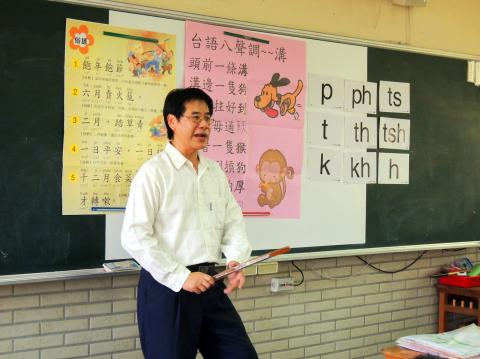|
Poems, magic help
teacher of Hoklo
INTERESTING: Su Yan-te composes four-line poems
and performs magic tricks to help his students learn the eight tones of
Taiwanese and build up their vocabulary
By Meng Ching-tzu and Stacy Hsu / Staff reporter, with staff
writer

Su Yan-te uses his own original
materials to teach the Hoklo language to elementary-school students in Greater
Tainan on Friday.
Photo: Meng Ching-tzu, Taipei Times
Su Yan-te (Ĭ®Ë¼w), a 54-year-old linguistic
teacher in Greater Tainan, has found an innovative way to inspire children to
learn Hoklo, also known as Taiwanese, by using short poems and magic tricks.
Before the start of each class, Su composes a four-line poem using colloquial
Hoklo phrases and rhymes to encourage his pupils to recite it with him. He then
explains the meaning of each word.
To hold their attention, he sometimes makes jokes using homophonic puns in
Mandarin and Taiwanese.
He also performs magic tricks to stimulate their interest in learning the
language. Before starting each lesson, he does a few tricks to catch the
students¡¦ attention and promises to do more afterward if they behave in class.
¡§Magic is very alluring to children. That¡¦s why I use it as a prelude to my
lessons to catch their full attention.¡¨ he said.
¡§This approach has helped the students pick up the eight tones of Taiwanese and
familiarize them with the Taiwanese Romanization system in a short span of
time,¡¨ Su said.
Unlike most Hoklo-language instructors who have difficulty securing a job
teaching the language, as it is not included in major entrance examinations, Su
has a surprisingly packed schedule. He teaches 30 hours a week at several
elementary and junior-high schools in Greater Tainan and Greater Kaohsiung.
Wang Chung-hsien (¨L©¾Äm), principal of Wen Hsien Elementary School in Greater
Tainan where Su has launched a curriculum for teaching Taiwanese, said Su really
knew how to teach the language, making his lessons one of the most popular
courses among students.
¡§Sometimes, we jokingly threaten to bar misbehaving students from attending Su¡¦s
classes. That¡¦s enough to scare them into behaving,¡¨ Wang said.
A Wen Hsien elementary-school student named Sung Yi-yi (§ºÐw½Ë) said she used to
have difficulty expressing herself in Taiwanese, because she only uses the
language to communicate with her grandparents.
¡§But now, I have made great improvements in my Hoklo and always look forward to
attending teacher Su¡¦s weekly Taiwanese class,¡¨ Sung said.
Su said that he started learning Hoklo about 30 years ago, and then decided to
join a training program to teach the language at Tainan Theological College and
Seminary.
He began teaching after passing his teacher¡¦s certification assessment test
about 11 years ago.
Su sought to capture students¡¦ attention when he started teaching by performing
magic tricks, but he only knew a handful of tricks and found himself running out
of gimmicks after the fourth lesson.
He was then apprenticed to a professional magician to learn more tricks to
engage his students, and what used to be a hobby turned into a second career.
As a Hoklo-language teacher, Su also uses his magic performances to promote the
language, occasionally asking the audience the name of a few objects ¡X usually
his magic show props ¡X in Hoklo.
Su said some members of the audience have asked him why he does not use the
¡§national language¡¨ (Mandarin) to perform.
His answer was: ¡§I do use the national language ¡X the national language of a
country called Taiwan.¡¨
|
![]()
![]()
![]()